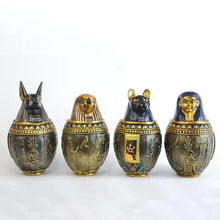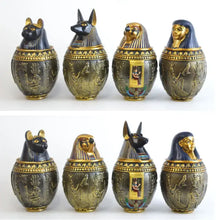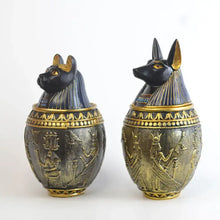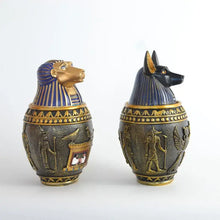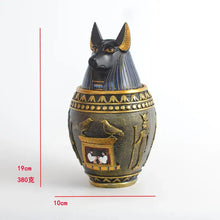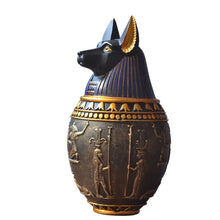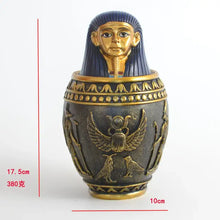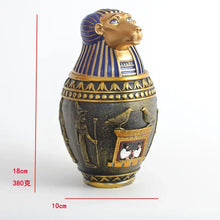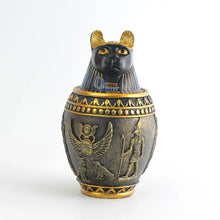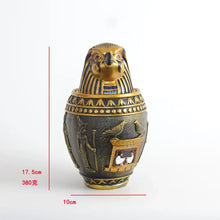
Ancient Egyptian Statue
- Composition: ecological resin, durable
- Hand made
- Storage pot
- Size: 18x10cm
- Weight: 0.4KG
- Careful details
- Long life span
About the different Ancient Egyptian Statue Design:
Ancient Egyptian Statue "Eagle"
In ancient Egyptian mythology, the eagle was associated with the god Horus, who was considered the patron deity of the Pharaohs. Horus was often depicted with the head of an eagle, and the bird was seen as a symbol of royal power, strength, and victory. The eagle was also associated with the sky and the sun, and was believed to be able to fly higher than any other bird. In some depictions, the eagle is shown holding the ankh, the symbol of life, in its talons, further emphasizing its association with divine power and protection. In addition to these associations, the eagle was also seen as a symbol of courage and determination.
Ancient Egyptian Statue "Anubis"
Anubis is a god in ancient Egyptian mythology who was associated with the afterlife and the process of mummification. He was depicted as a man with the head of a jackal, a carnivorous mammal native to Africa. Anubis was believed to be the guardian of the dead and was responsible for conducting the souls of the deceased to the underworld.
Anubis was also associated with the judgement of the dead, and was thought to weigh the hearts of the deceased against the feather of Ma'at, the goddess of truth and justice, to determine whether they were worthy of entering the afterlife. If the heart was found to be pure, the deceased was allowed to pass on to the afterlife. If not, their soul was devoured by the monster Ammit.
Anubis was also associated with funerary rites and the preparation of the dead for burial. He was often depicted in tomb paintings and funerary objects, and his image was often incorporated into the design of tombs and funerary artifacts. In addition to these associations, Anubis was also seen as a protector of the dead and was believed to have the power to guide and protect the souls of the deceased on their journey through the afterlife.
Ancient Egyptian Statue "Pharaoh"
In ancient Egyptian mythology, the Pharaoh was the supreme ruler of the land and was considered to be a living god on earth. The Pharaoh was seen as the embodiment of the gods Horus and Ra, and was believed to have a special relationship with the divine. The Pharaoh was responsible for maintaining ma'at, the cosmic balance and order, and was seen as the protector and guardian of the people.
The Pharaoh was also seen as a mediator between the human world and the divine world, and was believed to have the power to communicate with the gods and to make offerings on behalf of the people. The Pharaoh was responsible for the administration of justice and the maintenance of law and order, and was seen as the ultimate authority in all matters.
In addition to these spiritual and political responsibilities, the Pharaoh was also seen as the patron of the arts and the protector of culture and tradition. The Pharaoh was expected to lead by example and to embody the virtues of wisdom, justice, and compassion.
Ancient Egyptian "Monkey"
Monkeys were sometimes depicted in Egyptian art and were considered to be intelligent and mischievous animals. Monkeys were also associated with the god Thoth, who was the god of wisdom, knowledge, and writing. Thoth was often depicted with the head of an ibis or a baboon, both of which are species of monkey native to Africa.
In addition to these associations, monkeys were also sometimes seen as symbols of playfulness and mischief in ancient Egyptian mythology. They were believed to be intelligent and resourceful animals, and were often depicted as clever tricksters in stories and myths.
Benefits to buying an ancient Egyptian statue for decoration:
Aesthetic appeal: Ancient Egyptian statues are known for their intricate and ornate design, and can be a visually striking addition to any space.
Cultural significance: Ancient Egyptian statues represent a rich cultural history and can be a unique and interesting addition to your home decor.
Historical interest: An ancient Egyptian statue can be a conversation starter, and can spark interest in the history and culture of ancient Egypt.
Status symbol: In some cultures, owning an ancient Egyptian statue is seen as a symbol of wealth and status.
It's important to note that buying an authentic ancient Egyptian statue can be expensive, as they are made of materials such as stone or bronze and require skilled craftsmanship to create. Alternatively, you can consider purchasing a replica or decorative statue, which may be more affordable and still provide many of the same benefits as an authentic one.










